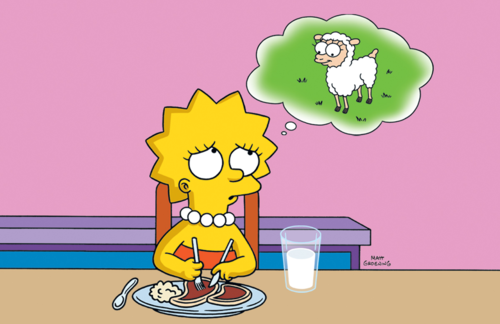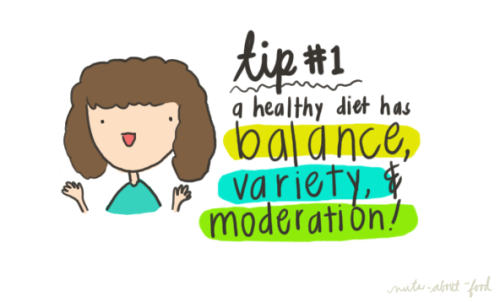Okay, disclaimer over.
If you want the tl;dr version of my view on veganism/vegetarianism (hereafter just referred to as veganism) in eating disorder recovery it's simple: don't do it.
First from the nutrition stand point, yes, a vegan who is eating adequate calories from a variety of sources can get all the nutrients she needs without any animal products (with maybe the exception of vitamin B12), but at the same time, this vegan is menstruating properly, has enough fat stores on her body, is not deficit in any minerals or vitamins, and most importantly not experiencing any starvation symptoms. In other words she is baseline healthy. However, when you restrict your caloric intake, you begin below the healthy baseline and if you add a vegan diet on top of that, you put yourself at a massive risk for severe vitamin B12, folic acid, calcium, vitamin D, essential fatty acid, vitamin A, zinc, and iron deficiencies which leads to complications such as osteoporosis, amenorrhea, vision problems, hypogonadism, nerve damage, alopecia, the list goes on and on. When you are recovering from a restrictive eating disorder, you need more than an adequate amount of nutrients; you need an excess.
You can point out this and that vegan (all of whom shall remain unnamed) who has "perfect blood tests" and are healthy and vibrant but those people are not recovering from an eating disorder and they are eating much more than the average person in recovery is.
But all nutrition debate aside, the most important aspect of refraining from a vegan/vegetarian diet during recovery is that it never frees you from the restriction mind set. I've seen so many girls who decide to turn vegan/vegetarian as a way to use ethics and lifestyle choices to refrain from certain foods. Yes, foods containing animal products, red meats, cookies, cake, ice cream, butter, cheese, are all more calorically dense than fruits and vegetables and as a vegan, you suddenly don't have to eat those things anymore. Magic, right? Maybe for your eating disorder. Living under a vegan diet during recovery simply gives your disorder another demon to cling onto, to yoke you to, all under the guise of a "healthy, ethical choice."
Your disorder's best friend is the word "no." No to carbs, no to saturated fats, no to sugars, no to processed foods - it doesn't matter what the "why" is, but only that the restriction principle remains.
Can you honestly say that you can eat a row of oreos or half a bag of potato chips without any guilt? After all, those are vegan foods. Can you eat "vegan junk foods" without counting, measuring, guilt, fitting them in, or restriction? If not, then it is probably time to hold off on a vegan lifestyle until you are mentally better.
I do think that veganism is a very admirable lifestyle and ethical choice, but at the same time, remember that it is a privilege, not a right. Being able to chose to be vegan should be treated like a privilege you get to make when you are both physically and mentally healthy. During recovery, your health should be your number one priority and if that means eating some "cute little defenseless animals" then so be it. Religious veganism or fasting have exceptions for the sick and recovery is the same way. Your body simply cannot tolerate it right now; hold off on veganism, you can still come back to it when you are better again.
If you really want to be vegan for ethical reasons, then that's another thing to put on your "reasons to recover list."
You can point out this and that vegan (all of whom shall remain unnamed) who has "perfect blood tests" and are healthy and vibrant but those people are not recovering from an eating disorder and they are eating much more than the average person in recovery is.
But all nutrition debate aside, the most important aspect of refraining from a vegan/vegetarian diet during recovery is that it never frees you from the restriction mind set. I've seen so many girls who decide to turn vegan/vegetarian as a way to use ethics and lifestyle choices to refrain from certain foods. Yes, foods containing animal products, red meats, cookies, cake, ice cream, butter, cheese, are all more calorically dense than fruits and vegetables and as a vegan, you suddenly don't have to eat those things anymore. Magic, right? Maybe for your eating disorder. Living under a vegan diet during recovery simply gives your disorder another demon to cling onto, to yoke you to, all under the guise of a "healthy, ethical choice."
Your disorder's best friend is the word "no." No to carbs, no to saturated fats, no to sugars, no to processed foods - it doesn't matter what the "why" is, but only that the restriction principle remains.
Can you honestly say that you can eat a row of oreos or half a bag of potato chips without any guilt? After all, those are vegan foods. Can you eat "vegan junk foods" without counting, measuring, guilt, fitting them in, or restriction? If not, then it is probably time to hold off on a vegan lifestyle until you are mentally better.
I do think that veganism is a very admirable lifestyle and ethical choice, but at the same time, remember that it is a privilege, not a right. Being able to chose to be vegan should be treated like a privilege you get to make when you are both physically and mentally healthy. During recovery, your health should be your number one priority and if that means eating some "cute little defenseless animals" then so be it. Religious veganism or fasting have exceptions for the sick and recovery is the same way. Your body simply cannot tolerate it right now; hold off on veganism, you can still come back to it when you are better again.
If you really want to be vegan for ethical reasons, then that's another thing to put on your "reasons to recover list."





